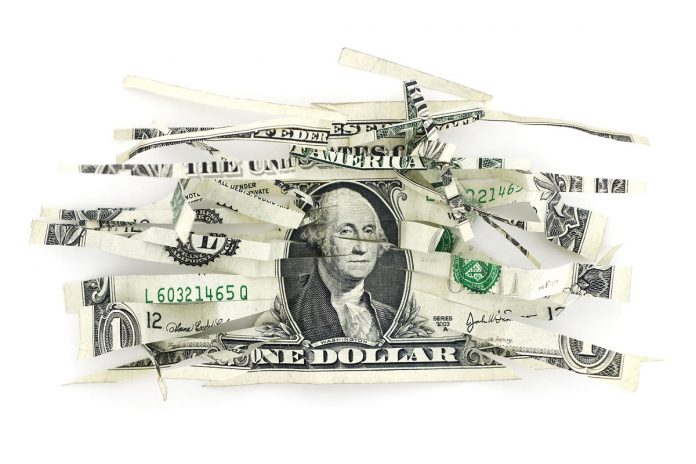As I write this, a delivery of Animal Cookies is on its way. I’m stocking up, because once I find a consistently reliable product I like, I stick to it. The strain is great; I can’t recommend it enough.
But it’s not from a brand-spanking-new, brightly lit, multimillion-dollar dispensary. And it’s not from a sanctioned delivery service, either. Nope, I stumbled upon this stash the old-fashioned way: Got passed a blunt at a show recently, enjoyed it, asked my friend where they got it, secured the contact, introduced myself and raved about the product, struck up a conversation, and nabbed a new connect.
It felt a bit weird buying on the black market again, honestly, because I hadn’t in a long time. Of course, I want lab-tested product—but not at $350 an ounce. I’ve been playing by the rules, trying to support a system I want to believe in so badly. But it’s broken, and it’s gotten more broken over the past year. And that’s precisely why I found myself buying bud from a buddy instead of a budtender.
If you think I’m the only one disappointed in the legal cannabis market, you’re sorely mistaken. My disdain for dispensaries is rooted in the product selection at my favorite spots falling off a cliff and price-gouging that occurs regularly as a result of limited legal competition. But I realize on the other end of it, someone has to answer for people like me to the board of directors and investors. You see, I’m far from the only cannabis consumer who has done the unthinkable and retreated to the pot procurement process of the past. (Only once—I swear!) And that means disappointing sales that fly in the face of lofty projections.
For the most part, investors aren’t particularly pleased with their cannabis portfolios right now. Not all that long ago, there were more than twenty publicly traded cannabis companies with valuations higher $1 billion. Now? There are eight…barely. Tilray scrapes the bottom of the billionaire barrel and may yet drop out of the club. (The other seven are Canopy Growth, GW Pharmaceuticals, Curaleaf Holdings, Cronos Group, Innovative Industrial Properties, Aurora Cannabis, and Green Thumb Industries.)
After Tilray’s shares peaked at $300 per in 2018, just two short months after a $17-per-share initial public offering, the company lost roughly three-quarters of its market cap in 2019. The catastrophic fall represented a loss of nearly $5 billion for the company and its investors. Things haven’t gone much better in 2020 for the Canadian cannabis producer, as it announced in February it had laid off more than 140 employees, or about 10 percent of its global workforce, as part of a restructuring effort to cut costs.
Tilray isn’t alone in its struggles. By January 2020, delivery service Eaze had burned through $166 million in funding and a bridge loan of $15 million, laid off a significant number of employees, and was days away from disconnection from the internet, its lifeblood. The company closed a $20 million Series D round in late February to fund creation and marketing of its own product line. Weedmaps took a huge hit to its revenue when forced to remove illegal dispensaries from its platform and laid off a chunk of its workforce in the past year. Both Greenlane Holdings and Acreage Holdings eliminated positions after “strategic reviews.”
“In the wake of [2019’s crash], the businesses that have weathered the storm are stronger than ever and ready to bring this industry to the next level.”
Ryan G. Smith, co-founder and CEO, LeafLink
Perhaps the most notorious meltdown has been MedMen, which developed much-publicized problems making enough revenue to keep pace with the mountain of money the company spent becoming a go-to dispensary brand. The company cut 40 percent of its workforce in November, 128 people in February, and another 85 in March. Co-founder and Chief Executive Officer Adam Bierman stepped down and surrendered his Class A super-voting shares under pressure after wide reporting the company offered creditors stock in lieu of cash to settle debts. MedMen’s stock plunged to 13 cents per share in March, down from $3 at the same time last year.
When the hype surrounding cannabis reached its fever pitch, everybody and their brother (and, surprisingly, their mother) tried to find a way to invest, exploring any and every possible avenue to get their foot in the door and reap the fortune that surely would rain down upon everyone involved. People who had never cared about weed in their entire lives suddenly were phoning their favorite stoner to figure out what brands and products were going to rise above the rest and become the pillars of the burgeoning industry. It was a free-for-all. And like the dot-com boom in the 1990s, the cannabis boom was never going to be sustainable at that rate.
In 2013, shortly after Colorado became the first state in the nation to fully legalize cannabis for medical and recreational use, the industry received an infusion of $17 million in venture capital. In 2017, that number jumped to $426 million before skyrocketing to $1.6 billion in 2018. Last year, the number ballooned again to nearly $2 billion but began to trend downward in the third and fourth quarters due to a wide range of factors: scandals, waning interest from mainstream investors, and supply chain issues, among other reasons.
“You can trace a lot of this back to the boom-or-bust gold rush mentality,” said Grove Bags founder Jack Grove, who mentors companies about raising capital when he’s not running his packaging operation. “I think the tech boom is a really great comparison for cannabis, because there’s a lot of regulation and nobody quite knows how it’s going to pan out. If you look at the cannabis equity markets, it’s about an 80- to 85-percent fall between now and this time last year.
“You had a lot of pent-up capital demand for the cannabis space, and a lot of companies started getting interested in cannabis investing and becoming active,” he continued. “A lot of these companies went in very aggressively without a solid understanding of the market and how developed it had already been. As a result, there were some dramatic overvaluations. We had outrageous price-to-earnings for some of these publicly traded cannabis companies that were very reminiscent of tech companies in that respective boom. That showed a lack of understanding and that people just didn’t want to miss the boat on cannabis. Naturally, a lot of those people shake out, including a lot of the sham operators that aren’t dedicated to advancing the field.”
Now, beyond all the hurdles companies in the cannabis sector already were going to have to leap to get back in the black and in good graces with their investors, the coronavirus pandemic has come along and made things exponentially worse. The worldwide health crisis has brought many operations in the U.S. and abroad to a complete halt and dramatically slowed operations for others. And the worst part is, no one knows how long the virus will continue to plague the global population and economy.
“All bets are off with this coronavirus,” Grove said. “Global supply chains are under enormous amounts of pressure. Companies are really scrambling right now. Italy is one of the biggest packaging economies in the world. That entire country is shut down. We are really in uncharted waters here, and these are not normal times. We will be seeing some disruption in the cannabis economy.”
The climate in the cannabis industry in 2017 and 2018 was one filled with immense hope, a community bursting with excitement for what lay ahead. States left and right had legalized, and it finally seemed like the U.S. had turned a corner on weed, ready to embrace a new era free from prohibition. Bumpy roads lay ahead with implementation and regulation, but that didn’t stop the industry from exploding, with hordes of new startups in the retail, processing, cultivation, and testing sectors ready to tap into the seemingly unlimited well of profits on the horizon.
Much of the slowed momentum in 2019 was due to federal laws not keeping pace with legislation at the state and local levels. While millions of people had access to legal marijuana across the country, marijuana remained a Schedule I drug in the eyes of the federal government and was treated as such by investors wary of crackdowns. Investors made a clear distinction between companies that “touched the plant” and those that circumnavigated federal prohibition by remaining an ancillary part of the industry, whether that meant writing software, producing cultivation equipment, or creating innovative new vaporizers and other accessories. As it became less and less likely cannabis would be legalized at the federal level anytime soon, investment in companies that produced or sold cannabis directly began to slow.
Inherent legalization issues weren’t the only challenge causing turbulence for the cannabis sector in 2019, as scandal also rocked the industry, affecting some of the biggest players in the game.
Pax Laboratories, successful with its series of cannabis flower and oil vaporizers and even more successful with the nicotine-based Juul vaporizer system, is one of the biggest benefactors of venture capital in the cannabis industry, receiving $420 million in funding in 2019 at a valuation of $1.7 billion. Despite its size and success, Pax was hit hard by fallout from the deadly vaping-related illness caused by illegal operators and their counterfeit vape products. The government clamped down on the vape industry, banning flavored tobacco-replacement products and worrying many that a crackdown on cannabis cartridges loomed just over the horizon.
The entire vaporizer market felt the shakedown and still hasn’t fully recovered. Now, it will face another massive blow from coronavirus: Most components for vape equipment come from Asia, and the supply chain will be choked for some time.
While 2019 was a sobering year for the cannabis industry, and the global pandemic we now face will present a whole new set of problems for companies trying to recover, many experts believe the industry will rebound…as long as companies learned from past mistakes.
“As the industry continues to expand in the broader market, the result will be an investment that is not only buoyant through a crisis, but one that is waiting to boom over the next five to ten years.”
Hershel Gerson, CEO and managing director, ELLO Capital
SōRSE Technology Chief Executive Officer Howard Lee said he’s already seeing a pivot in perspective. According to Lee, too many organizations made a critical mistake early on: They burned through cash trying to develop intellectual property to justify their inflated value. That meant they had to develop more and more proprietary strains, products, and processes to compensate for less-than-stellar sales and returns. The cycle became vicious.
That’s changing. “It used to be ‘I have all the time in the world. I’ll learn what I need to learn,’” Lee said. “Now, it’s ‘I have to hire subject-matter experts.’ Many cannabis companies thought they needed to invent everything themselves. That added to [funding] burn rate.”
He advises others to “find good partners.” Despite the industry’s general economic malaise and the financial disaster the COVID-19 pandemic threatens, in early March SōRSE acquired part of cancer research group Pascal Biosciences Inc. The move marks SōRSE’s first major foray into medical applications for its CBD infusion technology.
Others see the sort of flinty resilience only an industry born of outlaws can possess as the path to recovery.
“In 2019, we saw a lot of hype around big capital raises that led to inflated valuations, and ultimately market corrections followed when some of these companies were unable to deliver,” said LeafLink co-founder and Chief Executive Officer Ryan G. Smith. “In the wake of this, the businesses that have weathered the storm are stronger than ever and ready to bring this industry to the next level.”
Hershel Gerson, chief executive officer and managing director at ELLO Capital, is of much the same mind. “In 2019, the cannabis industry experienced growing pains and market corrections that shook confidence in the sector for some investors. But as the COVID-19 crisis expands, the situation is showing signs that it could be a catalyst for growth in the cannabis market,” he said. “Current data supports anecdotal evidence of increased demand, and the potential for social change suggests the uptick could be the precursor of a new era of acceptance.
“As the industry continues to expand in the broader market, the result will be an investment that is not only buoyant through a crisis, but one that is waiting to boom over the next five to ten years,” he added. “In comparison, travel, hospitality, and the financial industries are poised to feel the impact of the rolling recession years after a vaccine is secured.”
Grove, too, sees reasons to be optimistic. “I think we are starting to see some recovery, especially in the cannabis private equity markets and the cannabis venture equity markets,” he said. “Certainly, that can be attributed to stabilization and a better understanding of the global cannabis market and increased global trade in cannabis. I think the opening of that international market gets people excited again about the potential for this industry.
“There are some operators who are doing very well,” he continued. “There are a lot of investors who think right now is a really great time to buy, and then there are a lot who are keeping their powder dry. People are looking for companies that don’t egregiously overspend, that don’t buy market share or spend money to make money. They want to invest in companies that make more than a dollar for every dollar they spend. That’s a very good, simple metric to put this in perspective. Companies that have controlled their costs and been scrupulous about maintaining great supply networks and maintaining a very rigid business model, those are the ones that are doing well.
“There’s been a lot of fly-by-night guys, these guys who try to buy their way into success,” Grove added. “And as we’ve seen with some of these major failures recently, that’s not a successful path forward. Guys that are building organic growth with sustainable businesses that are producing cash and net profit month after month are the ones that investors are going to give capital in this beaten-up market.”
In the end, the cannabis industry isn’t unique, according to Emily Paxhia, co-founder and managing partner at Poseidon Asset Management. All industries suffer growing pains. “The cannabis industry is behaving like any other emerging, high-growth market in its early phases,” she said. “As the market matures, investors are looking to see concrete performance metrics and delivering on promises. We are now in a ‘Darwin phase’ of this industry, where the best or better operators will emerge and separate from the rest. Layoffs, constrained capital markets, and deeper investor diligence will force operators to truly focus on building strong fundamental businesses.
“While it is not a pleasant phase of the emerging market cycle to experience, it is a necessary culling to develop a mature and truly global industry,” she added. “Those of us who are focused on the long term of building an industry feel this is the time to lean in and invest in these strong businesses. This is where the real money will be made.”












